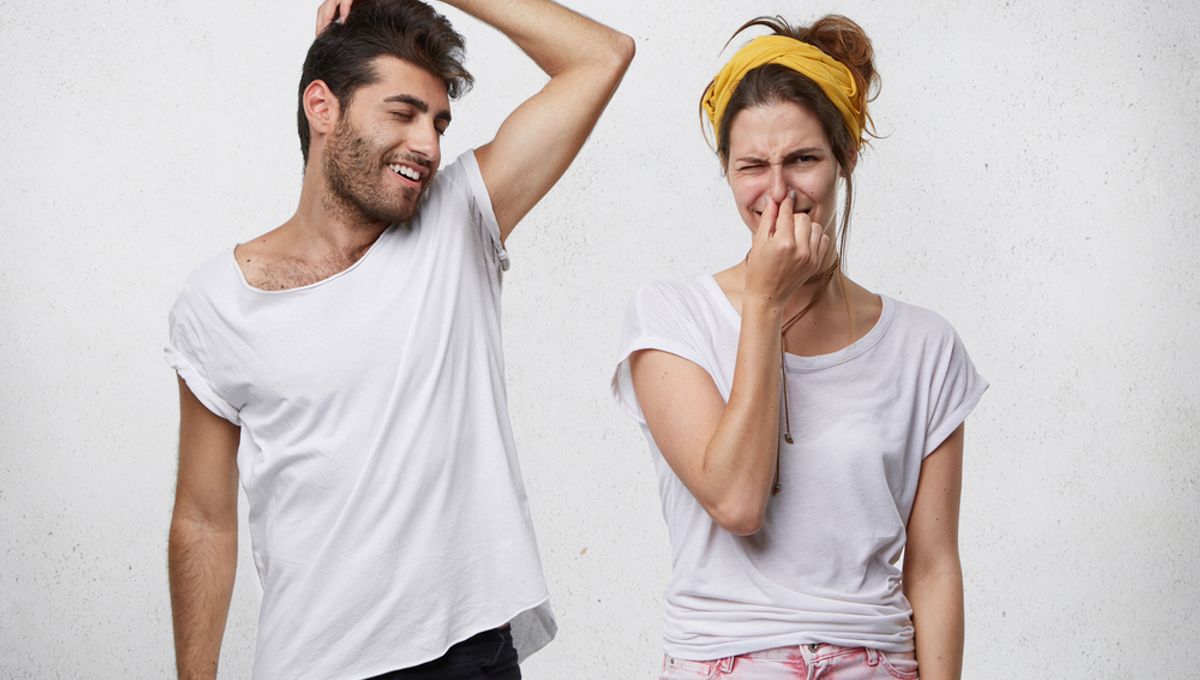
Sniffing odors from other people’s sweat could be a helpful tool in the treatment of social anxiety. It may be a little early to start hiding the deodorant from your friends and family, but recent results presented at the European Congress of Psychiatry did suggest that exposure to body odor augmented the positive impact of mindfulness therapy in a small study.
“Our state of mind causes us to produce molecules (or chemo-signals) in sweat which communicate our emotional state and produce corresponding responses in the receivers,” explained study lead Elisa Vigna, of the Karolinska Institute in Sweden, in a statement. “The results of our preliminary study show that combining these chemo-signals with mindfulness therapy seem to produce better results in treating social anxiety than can be achieved by mindfulness therapy alone.”
Those who experience social anxiety can find it difficult to participate in everyday situations due to the worry and stress that they feel about contact with others. Many people will have felt some degree of social anxiety after emerging from COVID-19 lockdowns and self-isolation, but there are those for whom the overwhelming fear is a constant, unwanted companion.
Various treatments are currently available, including talking therapies and antidepressant medication. The new pilot study used mindfulness therapy with a group of 48 women with social anxiety, aged between 15 and 35. Participants were divided into three groups, each exposed to a different odor during their treatment sessions.
Sweat samples were donated by volunteers who were asked to watch one of two different sets of movie clips. The researchers wanted to see whether the emotions that the person was feeling when the sample was taken could have an impact on the experiment. One group was shown clips from horror movies like The Grudge, designed to make them feel fear; the other was shown clips tailored towards happiness, from movies including Sister Act and Mr Bean’s Holiday.
The three groups of women being treated for social anxiety had mindfulness therapy over two days. During the sessions, one group was exposed to the “fearful sweat”, one to the “happy sweat”, and the third (who you might argue drew the long straw here) to clean air as a control.
“We found that the women in the group exposed to sweat from people who had been watching funny or fearful movies, responded better to mindfulness therapy than those who hadn’t been exposed,” Vigna said. “We found that individuals who undertook one treatment session of mindfulness therapy together with being exposed to human body odours showed about 39 percent reduction […] in anxiety scores. For comparison, in the group receiving only mindfulness (i.e., the control group) we saw a 17 percent reduction in anxiety scores after one treatment session.”
The team noted that there was no observable difference between the different groups exposed to sweat odors, so the particular emotional state of the person sweating did not seem to have an impact. They are now planning a follow-up to investigate this further, including sweat from people watching neutral documentary clips.
You’d be forgiven for never having considered your sweat in much detail, but it’s actually highly complex, made up of at least 300 separate compounds. The team hopes that one day, they might be able to isolate exactly which of these is responsible for the effects they’ve observed. There’s a fair bit more research to be done, so we wouldn’t recommend turning up to your next therapy appointment with your mate’s unwashed gym shirt.
As Dr Julian Beezhold, Secretary General of the European Psychiatric Association (who was not involved in the work) commented: “We welcome this study, looking at one of the least researched senses and its interaction with mental health. The findings are interesting but will need to be robustly replicated by independent researchers.”
The study was presented at the 31st European Congress of Psychiatry.
Source Link: A Whiff Of Someone Else's Sweat Could Help With Social Anxiety